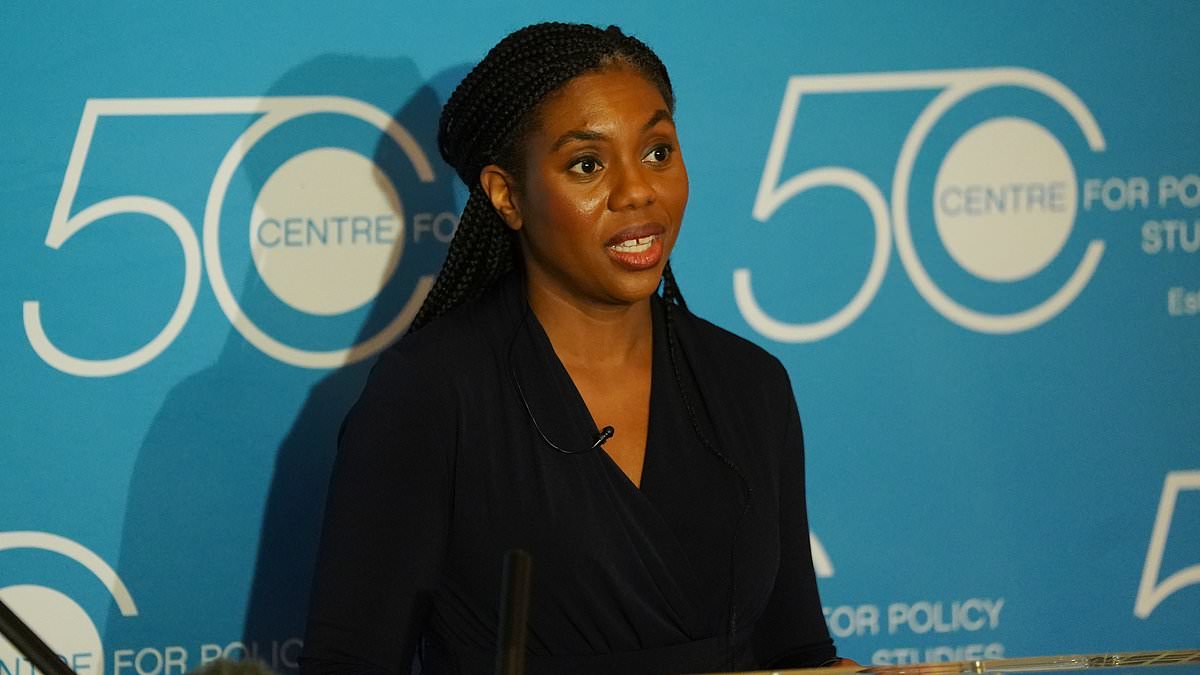The UK’s net migration record has been revised up to 906,000 in the year to June 2023 – as figures showed it has since fallen.
Official data covering the 12 months to June this year show long-term immigration was 728,000 higher than those leaving the country.
But the total for the year to June 2023 has skyrocketed upwards by 166,000 from the initial estimate of 740,000.
And a similar revision has been made for net migration in the year to December 2023, which was initially estimated to be 685,000 and is now estimated to be 866,000, an increase of 181,000.
The ONS said it now has more complete data and has also improved how it estimates the migration behaviour of people arriving in the UK from outside the European Union.
The scale of the inflows – with the peak roughly equivalent to adding two cities the same size as Leicester in a year – is poised to spark a fresh political row.
Kemi Badenoch used a major speech last night to insist the Tories would not allow Britain to be treated like a ‘hotel’ for migrants.
Of the 1.2million people who came to live in the UK in the 12 months to June this year, around 86 per cent – a million – from outside the EU.
Indian was the most common nationality in that group for for both work-related – 116,000 – and study-related – 127,000 – reasons.
Some 845,000 were of working age and 179,000 were children.
The ONS said that while remaining high by ‘historic standards’, net migration is now ‘beginning to fall’.
Director Mary Gregory said: ‘Since 2021, long-term international migration to the UK has been at unprecedented levels. This has been driven by a variety of factors, including the war in Ukraine and the effects of the post-Brexit immigration system. Pent-up demand for study-related immigration because of travel restrictions during the coronavirus pandemic also had an impact.
‘While remaining high by historic standards, net migration is now beginning to fall and is provisionally down 20 per cent in the 12 months to June 2024.
‘Over that period we have seen a fall in immigration, driven by declining numbers of dependants on study visas coming from outside the EU.
‘Over the first six months of 2024, we are also seeing decreases in the number of people arriving for work-related reasons. This is partly related to policy changes earlier this year and is consistent with visa data published by Home Office.
‘We are also starting to see increases in emigration, most notably for those who came to the UK on study-related visas. This is likely to be a consequence of the higher numbers of students coming to the UK post pandemic who are now reaching the end of their courses.’
The revisions come as the ONS has continued to review its net migration figures as more complete data becomes available and has improved how it estimates the migration behaviour of people arriving in the UK from outside the European Union.
Ms Badenoch warned yesterday that immigration levels are ‘a world away from where we need to be’.
She promised a ‘strict numerical cap’ on arrivals, with only those able to make a ‘substantial and clear contribution’ to Britain allowed in.
She will review Britain’s membership of the European Convention on Human Rights (ECHR) and the continuation of Labour’s Human Rights Act, which have both been blamed for blocking past attempts to get tough.
The Tory leader said there would be ‘zero tolerance for foreign criminals remaining in the UK’.
Tory ministers originally predicted their changes would cut numbers by 300,000, but the full effect will not be seen until next year’s figures.
The Treasury’s OBR watchdog has forecast that net annual migration will subside to 315,000 a year over the ‘medium term’.
Touring broadcast studios this morning, Home Office minister Seema Malhotra declined to say what level of net migration would be acceptable.
Ms Malhotra repeatedly dodged, insisting policy must be based on ‘a credible and serious plan’ and the Government should not ‘just pull figures out of the air’.
She told BBC Breakfast: ‘My point is this, we want to see net migration coming down, but we have to do so in a way that is tackling the causes of net migration, because if much of net migration has been driven by recruiting workers from overseas, you also have to look at what the impact on the economy would be.’
The OBR assessment published last month pointed to Home Office visa data covering the second quarter of 2024 showing a ‘sharp’ fall.
‘This largely reflects government restrictions coming into force in the first half of this year, which we now expect to have a slightly larger impact than we anticipated in March,’ the report released alongside the Budget said.
‘We judge the stronger outturn and larger policy impact to be broadly offsetting, and therefore project net migration will continue to fall in line with our March forecast.’
In her first major policy speech as Conservative Party leader yesterday, Mrs Badenoch said it was time to stop being ‘squeamish’ about the negative impacts of mass immigration and act to halt it.
She said that the UK could not cope with the ‘millions want to come’ to this country.
